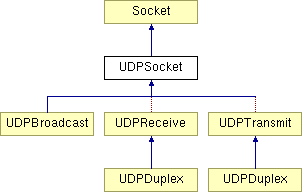
#include <socket.h>
Inheritance diagram for UDPSocket::

Public Methods | |
| UDPSocket (void) | |
| Create an unbound UDP socket, mostly for internal use. More... | |
| UDPSocket (const InetAddress &bind, tpport_t port) | |
| Create a UDP socket and bind it to a specific interface and port address so that other UDP sockets on remote machines (or the same host) may find and send UDP messages to it. More... | |
| virtual | ~UDPSocket () |
| Destroy a UDP socket as a socket. More... | |
| void | setPeer (const InetHostAddress &host, tpport_t port) |
| set the peer address to send message packets to. More... | |
| int | Send (void *buf, size_t len) |
| Send a message packet to a peer host. More... | |
| int | Recv (void *buf, size_t len) |
| Receive a message from any host. More... | |
| InetHostAddress | getPeer (tpport_t *port=NULL) const |
| Examine address of sender of next waiting packet. More... | |
| int | Peek (void *buf, size_t len) |
| Examine contents of next waiting packet. More... | |
Protected Attributes | |
| sockaddr_in | peer |
They can be used to pass unverified messages between hosts, or to broadcast a specific message to an entire subnet. Please note that Streaming of realtime data commonly use UDPDuplex related classes rather than UDPSocket.
In addition to connected TCP sessions, Common C++ supports UDP sockets and these also cover a range of functionality. Like a TCPSocket, A UDPSocket can be created bound to a specific network interface and/or port address, though this is not required. UDP sockets also are usually either connected or otherwise "associated" with a specific "peer" UDP socket. Since UDP sockets operate through discreet packets, there are no streaming operators used with UDP sockets.
In addition to the UDP "socket" class, there is a "UDPBroadcast" class. The UDPBroadcast is a socket that is set to send messages to a subnet as a whole rather than to an individual peer socket that it may be associated with.
UDP sockets are often used for building "realtime" media streaming protocols and full duplex messaging services. When used in this manner, typically a pair of UDP sockets are used together; one socket is used to send and the other to receive data with an associated pair of UDP sockets on a "peer" host. This concept is represented through the Common C++ UDPDuplex object, which is a pair of sockets that communicate with another UDPDuplex pair.
|
|
Create an unbound UDP socket, mostly for internal use.
|
|
||||||||||||
|
Create a UDP socket and bind it to a specific interface and port address so that other UDP sockets on remote machines (or the same host) may find and send UDP messages to it. On failure to bind, an exception is thrown.
|
|
|
Destroy a UDP socket as a socket.
|
|
||||||||||||
|
Examine contents of next waiting packet.
|
|
||||||||||||
|
Receive a message from any host.
|
|
||||||||||||
|
Send a message packet to a peer host.
|
|
|
Examine address of sender of next waiting packet. This also sets "peer" address to the sender so that the next "send" message acts as a "reply". This additional behavior overides the standard socket getSender behavior.
Reimplemented from Socket. |
|
||||||||||||
|
set the peer address to send message packets to. This can be set before every Send() call if nessisary.
|
|
|
|
 1.2.10 written by Dimitri van Heesch,
© 1997-2001
1.2.10 written by Dimitri van Heesch,
© 1997-2001